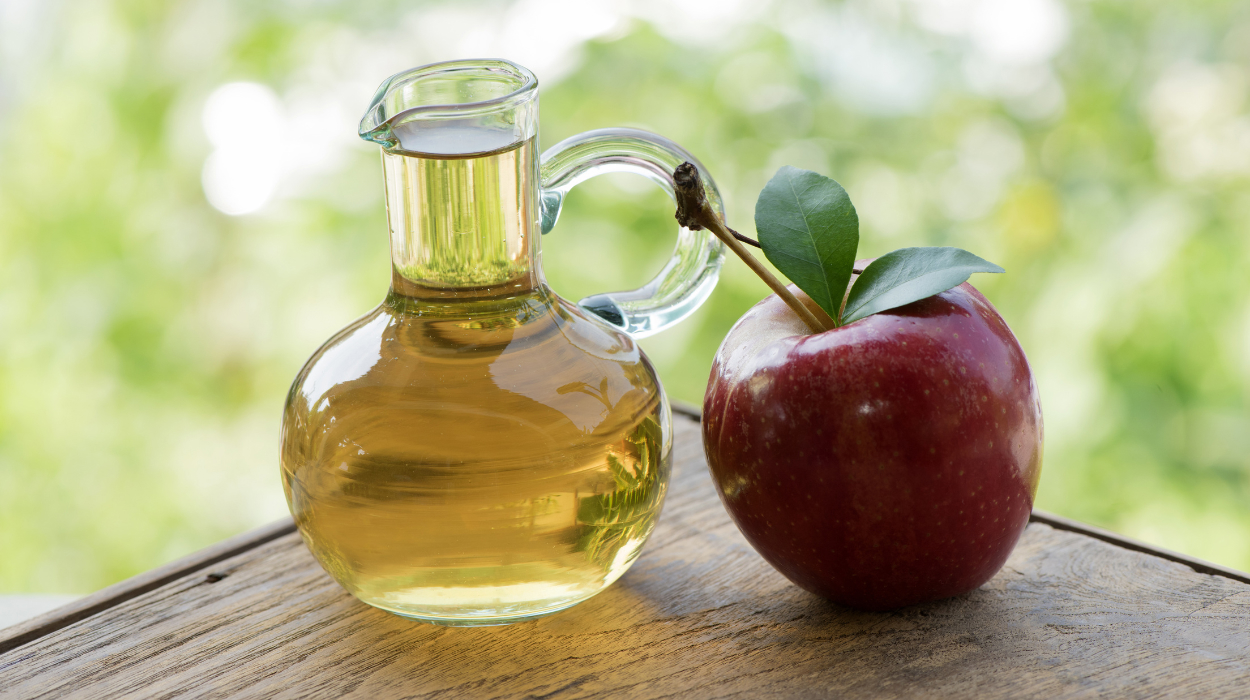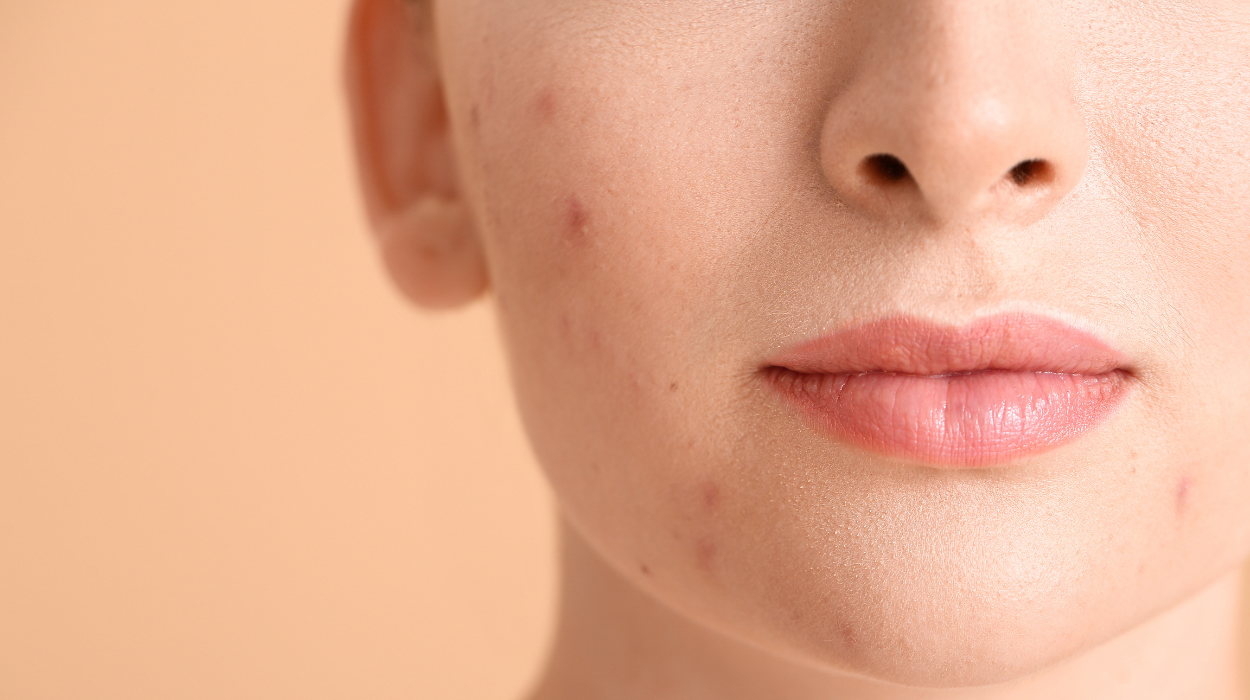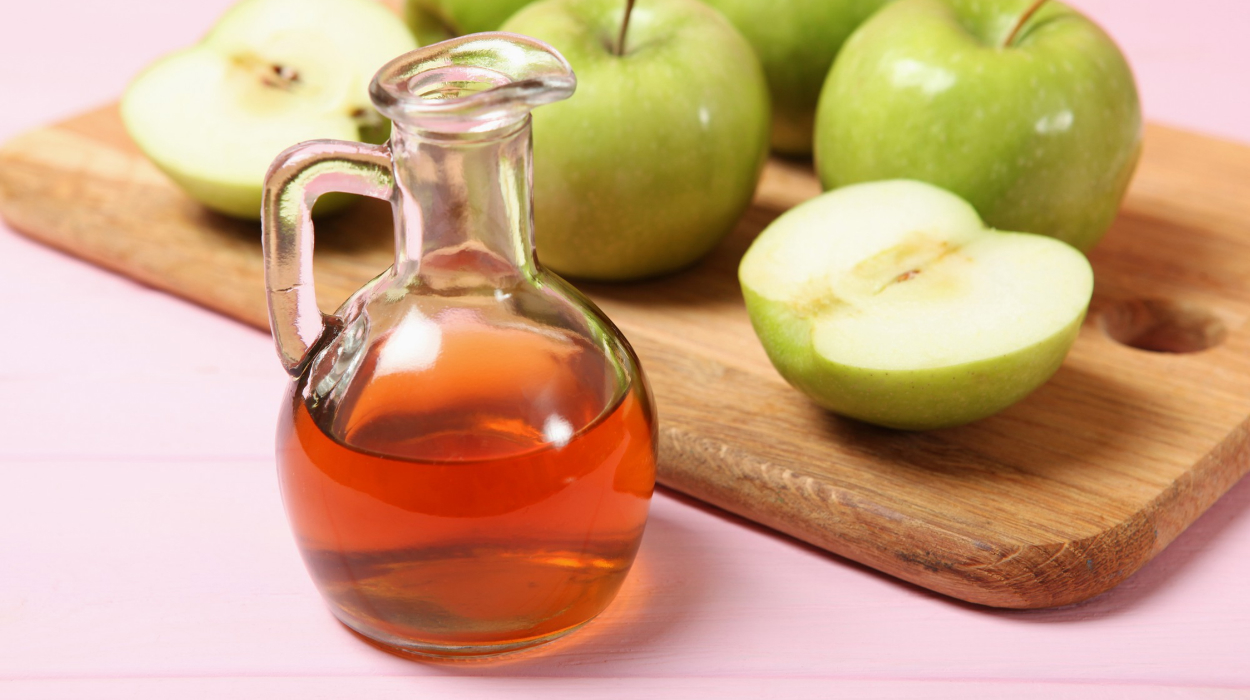Acne vulgaris, the most common skin disorder[1] worldwide, can be a persistent and frustrating skin condition with many potential causes. Amidst the numerous skincare products on the market, apple cider vinegar emerges as a natural remedy with promising benefits for those struggling with acne-prone skin.
Renowned for its antimicrobial, antibacterial, and anti-inflammatory properties, apple cider vinegar, or ACV, shows potential for managing acne. It has been shown to help balance skin pH, unclog pores, and reduce inflammation.
In this comprehensive guide, we discuss the benefits of using apple cider vinegar for acne treatment and how to incorporate it into your skincare routine effectively. Additionally, we offer expert tips to ensure safe and optimal usage. We also highlight other benefits of ACV for the skin.
Whether you’re dealing with occasional breakouts or chronic acne, this article will help you understand how you can achieve clearer and healthier skin with apple cider vinegar.
Does Apple Cider Vinegar Help With Acne?
Yes, apple cider vinegar helps with acne due to its anti-inflammatory and antibacterial properties. It helps reduce acne breakouts and improve skin appearance by balancing skin pH levels, reducing inflammation, and inhibiting bacterial growth.
Proper dilution and cautious application are crucial to avoid skin irritation and burns. Consulting with a dermatologist before using ACV for acne treatment is advisable to ensure safe and appropriate use.
Does Apple Cider Vinegar Work For Acne?

Applying topically diluted apple cider vinegar is a popular natural remedy for acne. Thanks to its antibacterial[2] and anti-inflammatory properties, it may provide benefits. Some individuals report improvements in acne symptoms after using ACV, which may help reduce inflammation, balance skin pH, and inhibit acne-causing bacteria.
While many anecdotal reports support the use of ACV for acne, scientific research on its effectiveness is limited. Some studies suggest that ACV may have potential in acne treatment,[3] but more research is needed to confirm its benefits conclusively.
Diluting ACV with water is essential to prevent skin irritation and chemical burns. It’s also advisable to consult a dermatologist before incorporating ACV into your skincare routine to ensure safe and appropriate usage.
How Can Apple Cider Vinegar Help With Acne?
Vinegar is considered a weak acid due to its acetic acid content. It also contains other organic acids,[4] including lactic, gallic, chlorogenic, protocatechuic, and malic acids. These acids, particularly acetic acid,[5] contribute to the antimicrobial and antibacterial properties of apple cider vinegar. Acetic acid gives vinegar its characteristic odor
ACV kills certain types of bacteria, including acne-causing bacteria[6] like Propionibacterium acnes or Cutibacterium acnes, Staphylococcus epidermidis, and Staphylococcus aureus. By killing these bacteria on the skin,[2] it may help reduce the risk of new acne breakouts.
The organic acids in ACV, such as acetic acid and malic acid, can act as mild chemical exfoliants,[7] helping to remove dead skin cells and unclog pores. This can prevent the formation of new acne lesions and improve overall skin texture.
The lactic acid, in particular, also helps fade hyperpigmentation[7] and acne scars over time. It is also moisturizes and improves the skin barrier against bacteria.
Additionally, ACV has antioxidant and anti-inflammatory properties.[8] Inflammation plays a significant role in acne development. ACV’s anti-inflammatory properties may help reduce the redness, swelling, and inflammation associated with acne and promote healing.
The skin’s natural pH is slightly acidic,[9] typically ranging between a pH of 4.0 and 6.0. When the skin’s pH becomes imbalanced, it can contribute to acne formation. ACV is acidic and can help restore the skin’s natural pH balance, creating an environment less favorable for acne-causing bacteria to thrive.
ACV’s ability to maintain the skin’s natural pH also helps control sebum or oil production, especially in people with oily skin. By controlling oiliness, ACV can reduce the likelihood of clogged pores and acne breakouts.
How To Use Apple Cider Vinegar For Acne

There are several ways to use apple cider vinegar for your skin, especially your face. Knowing how to use ACV at-home acne treatments can help you achieve clear skin in no time.
The following are ways to treat acne and acne scars:
ACV Face Wash
Dilute one tablespoon of apple cider vinegar with ¼ cup of warm water. Use this diluted ACV to cleanse your face gently. ACV face wash helps to remove dead skin cells and bacteria from the skin.
You may also add a small amount of ACV to your regular face wash to boost its acne-fighting properties.
ACV Face Mask
Mix one tablespoon of apple cider vinegar with two tablespoons of honey, yogurt, or bentonite clay. Apply the mixture to your face and leave the mask on for 10 to 15 minutes. Then, rinse with water.
ACV Toner
Mix equal parts of ACV and water to create an apple cider vinegar toner. Apply this mixture using a cotton ball or spray bottle after cleansing your face and before moisturizing. ACV toners help to balance skin pH, tighten the skin, and reduce bacteria and debris.
ACV Spot Treatment
Spot treatment is a way to use apple cider vinegar for pimples and acne blemishes. To spot and treat acne, apply a small amount of undiluted ACV directly to individual pimples or acne spots using a cotton swab or ball. Leave overnight and rinse in the morning.
Studies on apple cider vinegar and warts suggest spot treatment with ACV can help remove warts. It is presumed that the acetic acid in ACV[10] destroys the infected tissue, making the wart drop off.
ACV Bath
Add one to two cups of ACV to your bath water and let it soak for 15 to 20 minutes. You can use it to target acne on your chest, back, and other areas of the body.
Dietary Addition
Some proponents suggest that drinking diluted ACV is another way to enjoy the benefits of ACV on your skin. They believe ACV consumption can fight acne because it lowers bacterial colonization in tissues.[2] However, more research and professional advice are needed to confirm this belief, its level of efficacy, and its dosage.
However, it is proven that antioxidants and acetic acid, which are present in ACV, have skin health benefits. Antioxidants[11] can help protect the skin from oxidative stress and damage caused by free radicals, while acetic acid may support gut health,[12] which can indirectly impact skin health.[13]
Apple cider vinegar is also available as a supplement. You may get it as ACV pills, gummies, capsules, or powder. However, be sure to read the nutritional label, as the supplement could contain additional ingredients, vitamins, and minerals.
Side Effects And Safety Tips
While apple cider vinegar can be an effective acne treatment for some individuals, its strong acidic nature can cause the following side effects:
- Skin irritation.
- Chemical burns.
- Dryness and flakiness.
- Increased photosensitivity.
- Staining.
- Exacerbation of certain skin conditions.
- Erosion of tooth enamel.
To minimize the risk of side effects, always dilute ACV with water before applying it to the skin. ACV contains acetic acid, which is harsher than salicylic acid or glycolic acid found in cane-fighting medications and can cause skin damage.
Additionally, perform a skin patch test on a small area of skin before using ACV on your face or larger areas to check for any adverse reactions or sensitivity. Also, avoid using ACV too frequently, in high concentrations, or on open wounds.
If you experience severe irritation or worsening of acne, discontinue use and consult a dermatologist.
Other Benefits Of Apple Cider Vinegar For Skin
In addition to potentially aiding in acne treatment, apple cider vinegar offers several other benefits for skin health. These include:
- Balancing skin pH.
- Chemical exfoliation.
- Reducing dark spots.
- Sunburn prevention and relief.
- Reducing wrinkles.
- Controlling excess oil.
- Skin brightening.
- Toning.
- Wart removal.
- Skin tag removal.
There are other benefits of apple cider vinegar for your overall health, including weight loss, blood glucose control, gut health, hair health, and heart health.
Conclusion
If you’ve been asking, does apple cider vinegar help with acne? Apple cider vinegar offers promising benefits for acne treatment and overall skin health.
Its antibacterial, anti-inflammatory, and pH-balancing properties can help alleviate acne symptoms and improve skin appearance. It is a common ingredient in many skin care products and can be applied as a facial cleanser, toner, or spot treatment.
However, it’s essential to use ACV cautiously, dilute it properly, and perform patch tests to prevent irritation and chemical burns. If you have sensitive skin or existing skin conditions, consult with a dermatologist before incorporating ACV into your skincare routine.
With proper usage, apple cider vinegar can be a natural and effective way to combat acne and achieve clearer, healthier skin.
Frequently Asked Questions
Using apple cider vinegar on your face has benefits for acne treatment, exfoliation, and skin health. However, it should be diluted and used cautiously due to its acidic nature to avoid adverse effects like irritation and burns.
Apple cider vinegar’s antibacterial properties may offer some relief for cystic acne with internal and external use, but it’s essential to dilute it properly.
The time it takes for apple cider vinegar to clear the face varies depending on individual skin types, severity of acne, and consistency of use. It may take a few weeks of regular use or longer to see results.
 Expert's opinion
Expert's opinion
